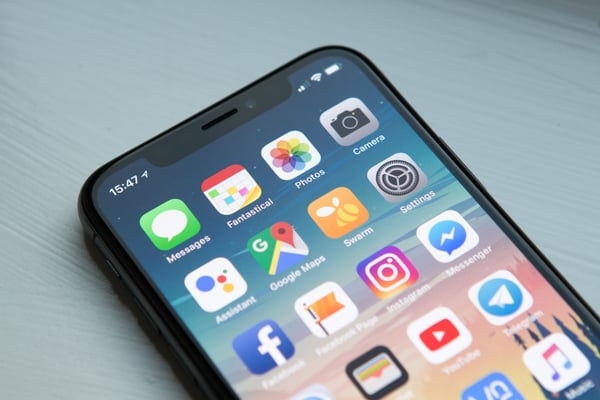5 Tips for Identifying Your Mobile Game's App Store Competitors
by Game Marketing Genie, on 01-Oct-2020 14:15:30
App stores are flooded with applications of all sizes. The numbers show almost 2.6 million apps on Google Play Store and over 3 million on iOS App Store (source: Statista).
If you don't ensure your app makes an impact after launching it, then the chances of your application making it are minimal. To be seen by your target users, you need to optimize your app for the store you're launching it on.
App store optimization (ASO) enhances your app to increase its visibility in app stores and accelerate conversions. And it's essential when 0.01 of apps actually make it. This means that out of every 10,000 launched apps, only one makes it, and the other 9,999 apps don't. You need yours to be that one in 10,000.
Let's look at ways to identify competitors and outpace their marketing efforts to help your app succeed.
1. Find competitor apps
Finding your competitors is the first step in your competitor analysis framework. But how do you know who they are? You might think shortlisting them is like finding a needle in a haystack — but it's not!
That’s why we’ve created this handy guide. Run through the following items to determine your competitors' names without hassle.
- Look for apps that fall in your niche or that are similar to yours in use. These are your direct competitors.
- Check for apps that have a similar target market as yours. Through this, you can understand both your competition and audience better.
- Keep an eye out for apps that share similar features to yours. When shortlisting these applications, you don’t have to focus on their unique selling propositions or what makes them different; but what makes you similar.
- Always watch out for those apps that don’t have anything common with you but fight for their share through the similar keywords you’re betting your app on. Those who fall in this category can be termed as ASO competitors.
You can perform these checks using the app store’s search engine. To understand your competitors better, you can also contact app store optimization experts that provide app store optimization services to ensure everything is done professionally.

2. Review app store rankings for similar apps
Now that you've found your competitor apps, it's time for you to analyze them for deeper insights. Reviewing the app store rankings for apps similar to yours will help you make better strategic decisions by analyzing their features and performance. This allows you to track where you may have missed out on your app’s development per the industry trends.
Start by analyzing the apps in your niche who are your direct and biggest competitors. You’ll want to identify what makes these apps get mileage and apply a similar tactic to your listing.
As you analyze the leading apps in your field and move on to the other competitors, you'll open up your understanding of their strengths and weaknesses. This information helps you get a bird’s eye view of your niche and industry that is not directly available in the market.
As we’re talking about the Google Play Store and Apple’s iOS App Store today, we will look at what elements each platform considers.

3. Competitor keyword analysis
Every app store uses specific metrics to check if it should rank an app higher or lower. Part of the recipe for success is keywords, which are one of the fundamental elements that rank apps higher.
You must be cautious about how you draft your gaming app's title. Research has revealed that apps that include a keyword in their title are likely to rank 10.3 percent higher than ones that don't. But you may be unsure how to incorporate a keyword in the title when you already have a defined brand name.
The iOS App Store allows 30 characters for your title, whereas the Google Play Store allows 50. Following your brand name, you can integrate your targeted keyword or keywords into your app title. If you think it may affect branding, it won't affect your app adversely if you don't include a keyword here.
However, you mustn't keyword stuff in your title (or anywhere else in your listing). You will be penalized and even banned if you overuse keywords in your title, which is considered inauthentic.
Once you've integrated your most targeted keyword into your app title, you can concentrate on the remaining keywords. You need to check what keywords your competitors use that make them rank higher in these application store search results.
Shortlist specific keywords that are prevalent in your niche and look out for competitors who show up every time that keyword is searched for. Furthermore, you need to check how much money they spend for their app to rank in the search results. This helps you to decipher if their campaigns are simple test campaigns, moderate, or aggressive campaigns. Check if they're using your brand's name as a keyword to market to ensure you come out on top.

4. Conduct competitor analysis
Competitor analysis is to compare and contrast the differences and similarities between your app and your competitors' apps. Every app has its strengths and weaknesses. By finding the assets and liabilities of your competitors, you can educate yourself on what elements to embrace and the ones you need to avoid.
You need to consider their images, descriptions, keyword usage, and more that app stores consider to calibrate your app's ranking. If you don't level up your app's visuals to the industry standards or surpass them, the chances of your audience avoiding your app are high.
Google and Apple have all different processes for reviewing an app. Let's take a look at these metrics in detail. Apple's app store ranking metrics include app name, URL, subtitles, keyword field, in-app purchase, ratings and reviews, updates, downloads, engagement, and more. In contrast, Google's Play Store includes app titles, short descriptions, long descriptions, in-app purchases, ratings and reviews, updates, downloads, and engagement, among other things. Though it is not simple to get the hang of all these metrics and strategies that your competitors use, a few are available at your reach. Let's take a look at them.
The download count of an app makes its ranking, also known as the download velocity. If the download velocity of an app is high, app stores rank them higher. Additionally, check your competitors' reviews. Reviews are one of the best ways to understand the good, bad, and ugly of an app. The highlight of the reviews section is that data is available at your disposal for no cost at all. It helps you understand what your target audience is looking for, their pain points, the elements they like, and more. This shows you the impact it created by providing a quality experience to its users.

5. Check out other resources
Other resources are available right at your disposal if you look around enough. With the internet at your fingertips, you can accumulate all the information you require regarding business.
Checking out your competitor’s social media accounts is one of the best ways to understand their strategy and business goals. Additionally, you can research any recent news articles related to them that have been published or check for any specific industry reports published by them. You can study their audiences as well. Running through all these resources helps you gain insights into the comprehensive strategies they’ve been employing over time and enables you to get a bigger picture.
Coupled with all these strategies, you must also analyze the industry trends. See what the opinion leaders in your industry have been recommending to boost the growth of apps across this mega-billion-dollar industry. Update yourself with these trends and transformations by attending networking events, conferences, and webinars to create a better app and provide your audiences with a high-caliber gaming experience.

Fulfill your quest with mobile game marketing
Mobile game marketing is your key to the quest for success! Take control of your new game and make its marketing matter with the help of our insider tips in Mobile Game Marketing: Your Complete Guide to Success.
But understanding what app store optimization is isn't enough. It's time for you to put it into practice. If you're not using ASO, you're missing out on chances for your app to succeed.
If you're not confident about implementing the best ASO practices for your brand by yourself, you should reach out to an app marketing agency. You must never forget that identifying and studying your competitors is not to imitate them but to provide an exceptional gaming experience by learning. The team at Game Marketing Genie can help you by crafting excellent app store optimization services specific to your mobile game, taking care of the entire process from start to finish.
Let us help you increase your brand’s visibility in the app stores and drive your conversions - contact us today!


